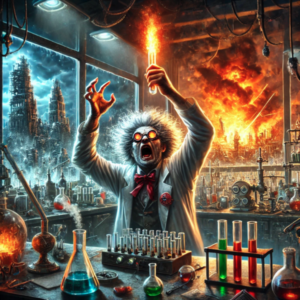 Bible Verse:
Bible Verse:
“Test all things. Hold on to what is good. Stay away from every kind of evil.” – 1 Thessalonians 5:21-22 (CSB)
As humanity strides toward unprecedented advancements, discernment rooted in faith is essential to distinguish between good and evil outcomes.
The Stanford report has revealed groundbreaking news: scientists aim to use artificial intelligence (AI) to create the world’s first virtual human cell. This cell would simulate the behavior of biomolecules, tissues, and organs, offering huge potential for medical breakthroughs. But as history shows, such progress is not without risk.
Progress or Peril?
Emma Lundberg calls this effort the “holy grail of biology,” a sign of its transformative promise. The ability to model human cells could revolutionize medicine, allowing new treatments to be tested without animal or human trials. Yet, history warns that unchecked scientific progress often leads to unintended consequences.
Albert Einstein once said, “Technology has exceeded our humanity.” This warning applies here. Virtual cells, while designed to help, could be misused. Bioweapons or unauthorized experiments are real dangers if ethical controls fall behind technological advances.
Who Holds the Power?
C.S. Lewis warned that scientific power often becomes a tool of the few to control others. The collaboration between Stanford, Genentech, and the Chan-Zuckerberg Initiative shows how such innovations remain in the hands of elite institutions. Who decides how virtual cells are used? Will they be shared for public good or kept for profit and power?
Are We Ready?
E.O. Wilson noted that humanity has “godlike technology” but “Paleolithic emotions.” This project forces us to ask: Are we ready for the moral questions it raises? Virtual cells could blur the lines between simulation and life itself. Without strict safeguards, this could lead to abuse, inequality, or harm.
Conclusion
The virtual human cell offers immense promise, but its risks are just as great. If science outpaces morality, we risk turning this “holy grail” into Pandora’s box. Strong ethical oversight is not just important—it’s essential.
Noting that recent advances in artificial intelligence and the existence of large-scale experimental data about human biology have reached a critical mass, a team of researchers from Stanford University, Genentech, and the Chan-Zuckerberg Initiative says that science has an “unprecedented opportunity” to use artificial intelligence (AI) to create the world’s first virtual human cell. Such a cell would be able to represent and simulate the precise behavior of human biomolecules, cells, and, eventually, tissues and organs.
“Modeling human cells can be considered the holy grail of biology,” said Emma Lundberg, associate professor of bioengineering and of pathology in the schools of Engineering and Medicine at Stanford and a senior author of a new article in the journal Cell proposing a concerted, global effort to create the world’s first AI virtual cell. “AI offers the ability to learn directly from data and to move beyond assumptions and hunches to discover the emergent properties of complex biological systems.” …
The Stanford Report